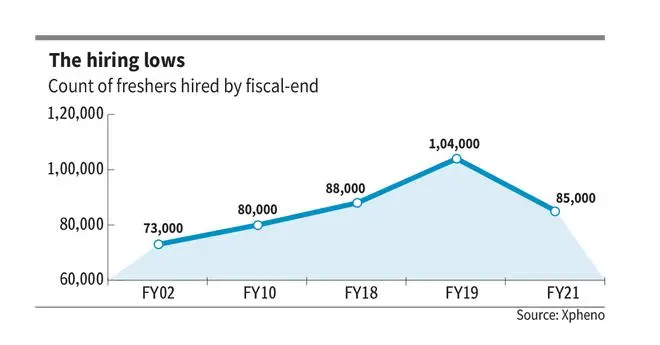At the start of the academic year, Devaki (name changed), a final year engineering graduate in a private college in Chennai, was excited about the prospects of joining one of the largest IT companies (which are the bulk recruiters of college freshers). However, she is nervous now as her wish may just remain a dream with the ‘bulk’ recruiters planning to stay away from campus recruitment in the coming months or reduce their intake due to strong bench strength, higher employee utilisation and a bleak business outlook.
Thousands of engineering graduates are staring at a bleak year ahead and colleges are adopting a wait-and-watch mode.
Infosys’ CFO Nilanjan Roy, while discussing the second quarter results told reporters, “We still have a significant fresher bench with us. We are training them on new skills like generative AI and SAP. At the moment, we are not going to the campuses as yet. We will monitor this every quarter looking at our future projections and then decide when to go back.”
However, S Ravi Kumar, CEO, Cognizant, says, the company will go to campuses in 2024. “We have already onboarded people who were hired from campuses in 2022 and started to onboard all those hired in 2023, and will continue to do that until the middle of next year,” he explains.
Low numbers
MS Prasadh, Workforce Research, Xpheno, says that the first half headcount among IT service bellwethers have further dropped the prospects for fresher intake this fiscal. With a 60-65 per cent projected drop, the FY24 is set to join the list of fiscals with the lowest fresher intake by the IT sector.
With the talent-build process broken, the IT sector could collectively clock way below one lakh fresher and entry-level additions this FY, he adds.

With the ‘talent-build’ model broken, engineering talent should brace for a slow career start. Institutions should explore options available for students to start in alternate domains that may not directly fall in their area of study. Understanding skills and functional adjacencies, and studying patterns of engineering talent movements across sectors is critical for institutions, says Prasadh.
Awareness and information on the talent pattern will help plan academic interventions, training inclusions and industry reach outs. Incubating talent, on an extended campus model with industry support can speed up the talent absorption process, he said.
According to Krishna Vij, Business Head, IT Staffing, TeamLease Digital, the major IT service companies have refrained from on-campus recruitment this year due to a weakened deal pipeline and fears of an economic downturn; and the trend is expected to continue.
The caution has resulted in a reduction in fresh campus hires, driven by the need for cost-efficiency and increased utilisation of their existing workforce, targeting an employee utilisation rate of 84-85 per cent. This delay in recruitment has affected potential job opportunities for graduates, leading to increased anxiety among them, she said.
Navigating the tough scenario requires freshers to explore opportunities beyond campus placements, participate in industry events, and expand professional networks. Emphasising soft skills as much as technical expertise is pivotal in this landscape. Demonstrating a diverse skill set and a balanced learning approach not only prepares freshers for the job market but also signifies their readiness to confront various challenges that may arise, she explains.
Positive note
While established IT players are exhibiting caution in campus hiring this year, the recruitment trend is expected to spike over the next one year with the subsiding economic fears. Especially in Indian start-ups, with over 80 per cent them having shown an increased hiring outlook in 2023, says Sachin Alug, CEO, NLB Services.
In the next year, the campus hiring figures are anticipated to rise in engineering institutes due to non-tech companies relying highly on technology talent to pursue their digital transformation strategies. The demand for technology talent is expected to grow by at least 9-10 per cent among non-tech sectors within the first quarter of 2024, necessitating them to scout for the right talent in academic institutions, he adds. This That should augur well for those entering the job market.








Comments
Comments have to be in English, and in full sentences. They cannot be abusive or personal. Please abide by our community guidelines for posting your comments.
We have migrated to a new commenting platform. If you are already a registered user of TheHindu Businessline and logged in, you may continue to engage with our articles. If you do not have an account please register and login to post comments. Users can access their older comments by logging into their accounts on Vuukle.